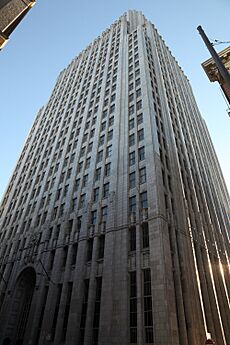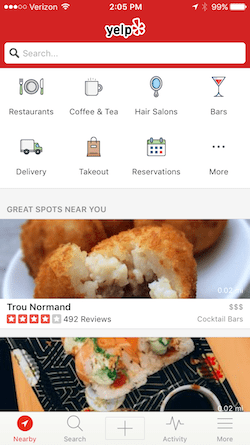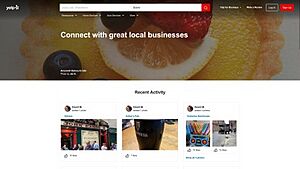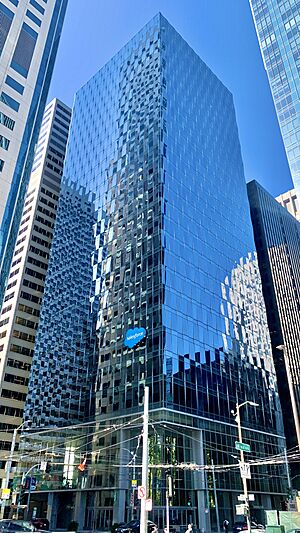Yelp facts for kids
 |
|
| Type of business | Public |
|---|---|
| Traded as |
|
| Founded | October 2004 |
| Headquarters | 350 Mission Street,
,
U.S.
|
| Owner | Jeremy Stoppelman (6.3%) |
| Founder(s) |
|
| Key people | |
| Industry | Local search, business ratings and reviews, online food delivery, local homeowner services |
| Products | Online advertising |
| Revenue | |
| Operating income | |
| Net income | |
| Total assets | |
| Total equity | |
| Employees | 5,116 (2024) |
| Native client(s) on | iOS, Android, Windows |
Yelp Inc. is an American company that created the Yelp.com website and the Yelp mobile app. These platforms let people share their opinions about businesses. Yelp is known for its "crowd-sourced" reviews. This means many people contribute their thoughts.
Yelp also helps with table reservations through a service called Yelp Guest Manager. The company's main office is in San Francisco.
Yelp was started in 2004 by Russel Simmons and Jeremy Stoppelman. They both used to work at PayPal. Since then, Yelp has become a top place for people to find and share reviews and ratings for all kinds of businesses.
Yelp grew a lot in its early years. By 2010, it had published about 4.5 million reviews. From 2009 to 2012, Yelp expanded into many countries in Europe and Asia. In 2012, Yelp became a public company. This means its shares could be bought and sold by anyone.
As of December 31, 2024, people had written around 308 million reviews on Yelp. In 2024, over 76 million people visited Yelp each month using computers or phones.
Sometimes, there have been concerns about how Yelp works with businesses. For example, some businesses felt that negative reviews were shown more if they didn't pay for ads. Yelp has also worked hard to stop "fake reviews." These are false reviews written to either promote a business or hurt a competitor.
Contents
Yelp's Journey: How It Grew
Starting Out (2004–2009)
Yelp was founded in 2004 by Jeremy Stoppelman and Russel Simmons. They got the idea when Jeremy had trouble finding a doctor recommendation online. They first thought of Yelp as an email network for referrals.
An early investor, Max Levchin, gave them $1 million to start. The name "Yelp" was chosen because it was short, easy to remember, and sounded like "help" or "yellow pages".
At first, Yelp's email system was a bit confusing. But then, they noticed users really liked the "Real Reviews" part. This let people write reviews without being asked. After Yelp changed its design in late 2005, it became much more popular.
Yelp received more funding in 2005, 2006, and 2008. The number of people writing reviews grew from 12,000 in 2005 to 100,000 in 2006. By mid-2006, one million people visited the site every month. By 2009, Yelp had 4.5 million reviews. In 2010, Yelp had about $30 million in revenue and 300 employees.
Growing as a Private Company (2009–2012)
Yelp started expanding internationally in 2009, launching in the United Kingdom and Canada. In 2010, it launched its first non-English site in France. Over the next few years, Yelp opened sites in many other countries, including Germany, Spain, Australia, Turkey, and Denmark. By the end of 2012, Yelp was in 20 countries. Its first site in Asia was in Singapore in 2012, followed by Japan in 2014.
In 2009, Google tried to buy Yelp, but they couldn't agree on a price. The deal didn't happen. Later, in 2015, Yelp claimed that Google was changing search results to help its own services.
Yelp also faced some investigations. In 2011, the Federal Trade Commission looked into Yelp's claims that Google was using Yelp's content without permission. In 2014, Google agreed to let services like Yelp choose if their data could be used on Google's websites.
Becoming a Public Company (2012–Present)

Yelp's shares started trading on the New York Stock Exchange on March 2, 2012. This meant it became a public company. In 2012, Yelp bought a big European review site called Qype. The next year, Yelp bought SeatMe, a company that helped with online reservations.
In 2012 and 2013, Yelp moved its main office to a new building in San Francisco.
Yelp became profitable for the first time in mid-2014. This was partly because more businesses were buying ads. Also, changes in Google's search system helped sites like Yelp appear more often. In 2014, Yelp launched in Mexico, Japan, and Argentina. It also bought other review sites in Germany and France.
In 2015, Yelp bought Eat24, a service for ordering food online. Later, in 2017, Yelp sold Eat24 to Grubhub. This deal also created a partnership to link Grubhub delivery with Yelp restaurant pages.
In late 2015, Yelp added a "Public Services & Government" section. Government agencies, like the Transportation Security Administration, started using Yelp pages. Yelp also began showing alerts for restaurants with low hygiene scores. Studies have shown that Yelp reviews can even help find food poisoning outbreaks.
In 2016, Yelp decided to reduce its operations outside North America. This meant fewer employees in other countries, focusing more on engineering and product teams.
Yelp continued to acquire other companies. In 2017, it bought Nowait, a restaurant reservation app, and Turnstyle Analytics, a Wi-Fi marketing company.
During the COVID-19 pandemic in the United States in early 2020, searches on Yelp dropped a lot. Yelp had to lay off many employees and cut executive pay.
In 2021, Yelp moved its headquarters to a smaller office in San Francisco. In 2023, Yelp closed several of its offices in the United States and Germany. As of mid-2023, Yelp has one office in San Francisco, plus offices in Toronto, Canada, and London, United Kingdom. As of February 2024, Yelp listed reviews for businesses in 32 countries.
How Yelp Works
|
Screenshot

The homepage of Yelp's iPhone app.
|
|
|
Type of site
|
Local online reviews |
|---|---|
| Available in | 15 languages |
| Owner | Yelp, Inc. |
| Commercial | Yes |
| Registration | Optional |
| Users | 142 million unique visitors per month |
| Launched | 2004 |
| Current status | Online |
| Written in | Python, Java, and a custom framework |
Yelp.com is a website where people can find and review local businesses. It's also a social network. Each business has its own page. On these pages, Yelp users can write reviews and give a rating from one to five stars.
Businesses can update their contact information, hours, and add special deals. Besides writing reviews, users can also react to other reviews, plan events, or chat about their lives.
Most businesses on Yelp have a rating of three stars or higher. Some reviews are written in a very fun or creative way. Users can give a "thumbs-up" to reviews they like. This makes those reviews show up more prominently.
About 72% of Yelp searches are done on a mobile device. The Yelp iPhone mobile app was launched in 2008. In 2009, an update added a cool "Monocle" feature. This let users see Yelp business info through their iPhone camera.
Yelp users can make restaurant reservations using "Yelp Guest Manager." This feature was first added in 2010. Yelp also added ways to order and deliver food. You can even see hygiene inspection scores for restaurants. Yelp's content is also used by Apple Inc.'s Siri and Apple Maps.
In 2014, Yelp added features for booking things like manicures, flower deliveries, or legal help. In 2016, Yelp started a cash-back program at some restaurants.
In 2017, Yelp launched "Yelp Questions and Answers." This lets users ask specific questions about businesses.
In 2020, Yelp added a COVID-19 section. Businesses could update their health and safety measures. Users could also give feedback on these measures.
In 2023, Yelp introduced "Yelp Guaranteed." This offers a refund if a project goes wrong. It also improved its search with AI and added video to reviews. In 2024, Yelp released "Yelp Assistant," an AI chatbot to help users find professionals.
Tools for Businesses
Yelp added a way for business owners to reply to reviews in 2008. Owners can send a private message to the reviewer or reply publicly on their business page. Sometimes, a business fixing a problem can lead a reviewer to change their negative review to a positive one.
Business owners can "claim" their profile on Yelp. This lets them respond to reviews and see how many people are looking at their page. Businesses can also offer discounts to frequent Yelp users. In 2014, Yelp released an app for business owners. This app lets them manage their profile and respond to reviews from their phone. Owners can also report a review if it breaks Yelp's rules.
Yelp makes most of its money by selling ads to small businesses. Advertisers can pay to have their business appear at the top of search results. They can also show ads on their competitors' pages.
In 2020, Yelp launched a tool for businesses to say they are "black-owned." This helped customers find and support these businesses. Searches for black-owned businesses on Yelp increased by 2,400% in 2020. In 2021, Yelp added a feature to filter businesses based on their COVID precautions.
Yelp's Impact on Businesses
A study from 2011 found that each "star" a business gained on Yelp could increase its sales by 5–9%. Another study in 2012 found that going from 3.5 to 4 stars on Yelp made a restaurant 19% more likely to be fully booked during busy times.
A 2014 survey of small business owners showed that 78% were worried about negative reviews. Also, 43% felt that online reviews were unfair. This was because there was no way to check if the review was from a real customer.
The Yelp Community
Most people who write reviews on Yelp, sometimes called "Yelpers," have good intentions. They write reviews to share their thoughts, improve their writing, or be creative. Some also write reviews to express their feelings about businesses they like or dislike. Reviewers can also be motivated by special badges or by getting praise from other users.
Many reviews are written in an entertaining way. Users can give a "thumbs-up" to reviews they enjoy, which helps those reviews get noticed more. Each day, a "Review of the Day" is chosen based on user votes. Many Yelp reviewers are adults who are good with computers.
Yelp encourages reviewers to use their real names and photos. Each year, some Yelp users are invited to join the "Yelp Elite Squad." These members are chosen based on how good and how often they write reviews. Elite Squad members must use their real name and photo. They also cannot own a business.
The Yelp Elite Squad started with parties Yelp threw for active members in 2005. Members get invited to special events, receive gifts, and enjoy other benefits. As of 2017, there were over 80 local Elite Squads in North America.
As of 2017, Yelp had over 80 community managers. These managers organize parties for active reviewers. They also send encouraging messages to reviewers and host classes for small business owners.
See also
- Crowdsourcing
- Reputation management
 | Aaron Henry |
 | T. R. M. Howard |
 | Jesse Jackson |




